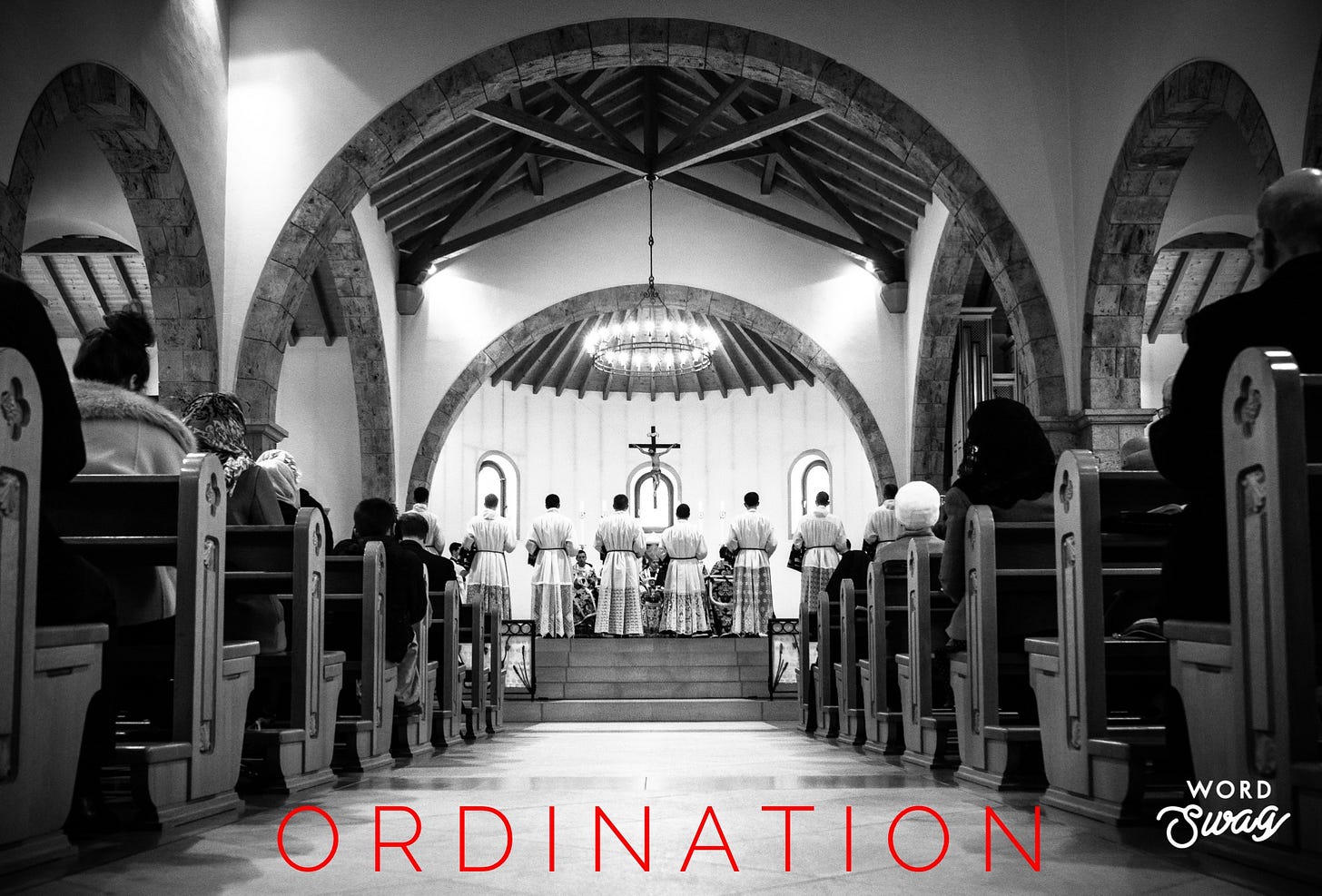Ordination

Ordination changes a man, not in a way that changes his liver into a lung, nor in a way that gives him magical powers to do sacramental tricks, but he is changed nevertheless. The change is more like when a degree is conferred upon a graduate or when a man marries a woman. In neither case is the man physically transformed, nor does he receive special powers. However, he is a changed man. No longer is the man a student. He is a graduate, possibly with a title attached to his name and all the clout that comes with his new status. No longer is the man a bachelor, but he is a husband who now has the privileges and duties of marriage. The molecular structure in his body may be the same pre- and post-ceremony; however, in many ways, he is not the same person. He stands in new relationships, and those new relationships, with all of their attendant responsibilities, make him a new man.
So it is with a man who is ordained to the gospel ministry. He is put into a new relationship before God and to the church. This new relationship with all of its attendant responsibilities makes him a new man.
The changes are an addition rather than a physical or even mystical metamorphosis. Ordination gives a new “weight” to the person. In biblical terms, this weight is “glory.” (The word “glory” in Hebrew literally means “heavy.”) Ordination glorifies a man in a unique way.
God makes this clear in the ordination of Aaron in Leviticus 8. A significant amount of literal weight was added to Aaron. He received new clothes: a coat tied with a sash, a robe, an ephod, a breastplate with engraved stones, the Urim and Thummim that resided in the breastplate, and a turban with a gold plate set on his head (Lev 8:5-9). These garments were for glory and beauty (Ex 28:2). While beautiful, they put a great amount of literal weight on Aaron related to the weight he would carry in his office.
Later in the ritual, Moses took unleavened bread, one loaf of bread with oil, one wafer, the fat pieces of an animal, and the right thigh of an animal in the hands of Aaron (Lev 8:26). Now his hands are full of weighty stuff as well. Aaron, while glorious, is under a great amount of weight, and he must bear up under this load, being faithful in these new relationships.
In ordination to the gospel ministry, weight is added to the man. This has been symbolized traditionally by giving him certain ministerial vestments and placing certain items into his hands. He is given a robe and a stole to vest him with the office. A Bible and possibly oil are placed in his hands with charges to be faithful in proclaiming the Scriptures and administering healing to those under his care. He is taken to the Font and the Table so that these are symbolically placed in his hands and charged to administer the sacraments in accordance with the commands of Christ.
This man is now a special representative of Christ, to proclaim his word, to be an example to be followed, to proclaim promises of forgiveness, to hold the keys of the kingdom, admitting and dismissing members. He is not the same man as he was before. He has been glorified. He bears great weight as a steward of the mysteries of God (cf. 1Cor 4:1-2). He doesn’t have any special powers, but he has a significant amount of authority. With that authority comes the great weight that should always weigh heavy on him: “God has given me the special task to speak on his behalf to his people and the world.” Any faithful man trembles daily carrying such great weight.
While there are men called out for this special ministry within the church who bear extra weight, all members of Christ’s church receive an ordination and the weight that comes with it. Paul says in Galatians 3:27 that everyone baptized into Christ has “put on Christ.” Each Christian receives a vestment in baptism: Christ himself. You are glorified at the font. You are a new person, having a new relationship to God and the world. With that vestment comes the attendant responsibilities. You bear the name of Christ. You speak for him in the world with your life and your words. This is a glorious privilege and a heavy responsibility. You are a steward of this gift God has given you, and it is required of a steward that he be found faithful (1Cor 4:2). Weigh your words, actions, and attitudes in light of the clothes that you wear—Christ himself.
May all of us, as Christ’s representatives, be found faithful.
The post Ordination appeared first on Kuyperian Commentary.

